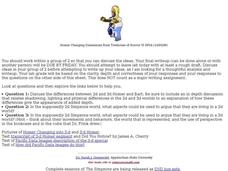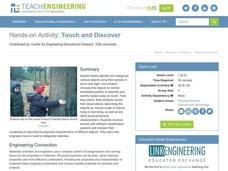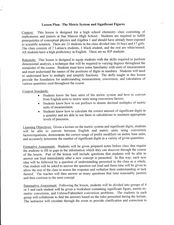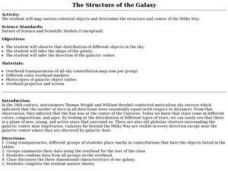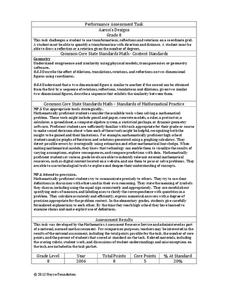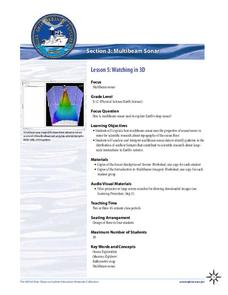Curated OER
Homer Changing Dimensions from Treehouse of Horror VE 3F04 (10/30?95)
In this writing worksheet, students view two and three Dimensional images of "Homer Simpson" and write a paper comparing and contrasting the two images. They are guided by three questions as well as supplied with four links to...
Teach Engineering
Thrown for a Loop
Round and round it goes. Class members observe a current carrying loop in a magnetic field and calculate its associated torque. They then apply what they have learned to example problems to solve for the torque and to calculate the...
Curated OER
Make Your Own "Weather" Map
Students create their own "weather" map using data from x-ray sources. They analyze and discuss why it is important to organize data in a fashion in which is easy to read. They compare and contrast different x-ray sources using a stellar...
Curated OER
Determining Momentum and Energy Loss of Balls Colliding Against Different Surfaces
Students experiment with the bounce of balls on various surfaces. In this physics lesson, students use various surfaces to bounce balls to study the momentum. This hands-on activity with the concepts of elasticity of surfaces which is...
Curated OER
Touch and Discover
Students work together to identify and categorize objects. They have to identify the object on touch because they are blindfolded. They record their data and describe the objects once they can look at them.
Curated OER
The Metric System and Significant Figures
Students compare and contrast the English and Metric system. In this chemistry instructional activity, students demonstrate how to convert English to metric and vise versa. They solve problems following the rules of significant figures.
Virginia Department of Education
States of Matter
Scientists have been studying exothermic reactions before they were cool. The lesson begins with a discussion and a demonstration of heat curves. Scholars then determine the heat of fusion of ice and the heat needed to...
Virginia Department of Education
Molar Volume of a Gas
What is a chemist's favorite plant? Stoichiome Tree! Scholars produce hydrogen gas by reacting magnesium with hydrochloric acid. Then they calculate the molar volume of the gas produced before answering assessment questions.
Virginia Department of Education
Solution Concentrations
What happens when you combine 6.022 times 10 to the 23 piles of dirt into one? You make a mountain out of a mole hill. Scholars use dehydration to obtain percent composition and then calculate the molarity of the original...
EngageNY
Finding a Rate by Dividing Two Quantities
Develop the right station to solve rate word problems. The 18th lesson in a series of 29 starts by interpreting the aspects of rates with two different quantities. Pupils use the interpretation of rates to solve problems, and groups work...
Kenan Fellows
How Much Energy Is That Anyway?
The fifth lesson in the six part series introduces units of energy including calories, Calories, and joules. Scholars determine the energy released when eating a snack and during activity.
Curated OER
The Structure of the Galaxy
Students infer the galaxy shape. In this structure of the galaxy instructional activity students observe the distribution of objects in the sky and answer questions.
Inside Mathematics
Aaron's Designs
Working with transformations allows the class to take a turn for the better. The short assessment has class members perform transformations on the coordinate plane. The translations, reflections, and rotations create pattern designs on...
Curated OER
Introducing Topographic Maps: Guiding Students from Concrete Models to Graphic Representations
Students interpret topographic maps and infer human activity as it is influenced by the landscape.
Curated OER
Recycled Paper
Sixth graders keep track of the amount of paper they consume on a daily, weekly, and monthly basis. The goal of the lesson is to have them all find ways to reduce the amount they use. Everyone creates recycled paper from old newspapers...
Curated OER
A Contouring We Go
Students examine the built environment and infrastructures of their community by constructing contour equipment, using the equipment, and comparing their results to current topographical maps of the same area
National Gallery of Canada
Memories of the Past
Explore contemporary American Indian art. After viewing a set of images, class members discuss the design elements of techniques present, as well as how these artists represent history and culture. Learners examine the parfleche and...
NOAA
Watching in 3D
Bring the ocean floor to life! Earth science scholars discover the process of deep sea mapping in the third installment in a series of five lessons about ocean exploration. The teacher's guide includes helpful resources, worksheets, and...
NOAA
Wet Maps
How do oceanographers make maps under water? Junior explorers discover the technologies and processes involved in creating bathymetric maps in part three of a five-part series designed for fifth- and sixth-grade pupils. The activity...
Curated OER
How Machines Help Us Stay Healthy
Students visit different departments at a local hospital to see how machines help peoples such as the CAT scan machine. They build a model of such a machine that shows how patients are moved in and out of the machine.
Alabama Learning Exchange
Energy and Work Amusement Park Style
Students distinguish between kinetic and potential energy. They recognize that energy can change from one form to other forms. They identify and describe several forms of energy.
Curated OER
Anything I Can Do You Can Do Better
Middle schoolers complete a two-week unit involving design and construction concepts. They watch a PowerPoint presentation about geometric shapes, draw the fourteen shapes incorporated in bridge construction, and in small groups design,...
Curated OER
Planet of the Apes
The "Planet of the Apes" is becoming a staple in many high school classrooms and provides a way to explore a variety of topics.
Curated OER
Kure Waste Chase Game Lesson
Students work together to identify marine debris. They explain the effect of the debris on various ecosystems. They draw different types of ocean currents as well.


